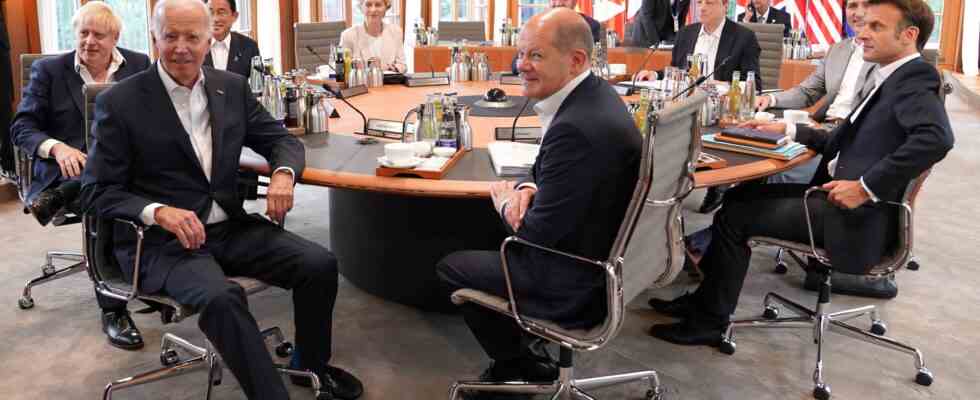background
Status: 06/28/2022 5:11 p.m
Billions for Ukraine, billions to fight hunger and a “climate club” – the heads of state and government of the G7 have concluded their summit at Schloss Elmau. The most important decisions at a glance.
support for Ukraine
The G7 countries pledge unlimited help to Ukraine in the war with Russia. The group will stand by the country “for as long as necessary and provide the necessary financial, humanitarian, military and diplomatic support to courageously defend its sovereignty and territorial integrity.” Final communiqué of the G7. The group is ready “to agree on long-term security commitments together with interested countries and institutions as well as Ukraine in order to help Ukraine in its self-defense and to secure its free and democratic future.”
Budget support of 29.5 billion dollars was also made available to Ukraine this year. The finance ministers would be instructed to determine the further financial requirements. The trade ministers, in turn, should consider reducing tariffs on Ukrainian goods. They are also “firmly committed” to supporting Ukraine’s reconstruction through an international reconstruction conference and an international reconstruction plan.
Dealing with Russia
The G7 want to impose “significant ongoing costs on Russia to help end this war” — more sanctions. Russia’s aggression is hampering the global recovery and leading to a “dramatic deterioration in energy security and access to food around the world.” The armaments industry and the technology sector are to be the focus of new sanctions against Russia. “We are determined to reduce Russia’s revenues related to gold,” the paper said. No further details were given.
Four of the G7 countries – Great Britain, the USA, Canada and Japan – had already announced a ban on imports of Russian gold on Sunday. Germany, France and Italy as EU members among the G7 are not averse, but point to the necessary talks within the European Union. Chancellor Scholz said on ZDF that the G7 summit could therefore not make a “final” decision on the issue.
Energy and economic crisis
The heads of state and government want to help “stabilize and transform the global economy while tackling the problem of the rising cost of living for our citizens.” In addition, the resilience of supply chains should be strengthened and a level playing field should be guaranteed.
In order to secure the energy supply and slow down the rise in prices, “immediate measures” would be taken – also by examining additional measures such as price caps. On the one hand, the upper limit is intended to ensure that Russia no longer benefits from price increases on the energy market. On the other hand, it should contribute to a relaxation on the oil markets worldwide. “We reaffirm our commitment to gradually ending our dependence on Russian energy without compromising on our climate and environmental goals,” the states wrote.
Billions against hunger
In order to protect people from hunger and malnutrition, the G7 group wants to use the Alliance for Global Food Security to increase global food and nutrient security. “To that end, we will provide an additional $4.5 billion, stand by our commitments to keep our food and agricultural markets open, and step up our efforts to support Ukraine’s production and exports.”
The G7 states announced on Sunday that they were countering China’s growing influence in developing countries with a 600 billion dollar (568 billion euro) investment program. The project is based on an EU program launched last year, which envisages investments of 300 billion euros up to 2027. The USA is now contributing a further 200 billion dollars, Japan 65 billion dollars, with the funds in all cases also supposed to come to a large extent from private investors.
“Climate Club” and climate protection
The G7 agreed joint efforts for climate protection with the host countries Argentina, India, Indonesia, Senegal and South Africa. According to a statement, the switch to climate neutrality should be promoted. At the same time, energy security should be ensured. Renewable energies are to be expanded and coal is to be used less and less, whereby they want to do justice to both environmental and social aspects. The signatory states want to focus on energy partnerships.
The heads of state and government also tentatively supported the idea of a global “climate club”. The idea promoted by Chancellor Olaf Scholz at the G7 summit in Elmau provides for countries that agree on ambitious environmental goals to be exempted from climate-related trade tariffs. “We stand firmly behind the goals of an open and cooperative international climate club and will work together with partners to found it by the end of 2022,” says the final declaration.
The G7 also want to “largely decarbonize” the road transport sector by 2030, “completely or mostly decarbonize” the power sector by 2035, and take concrete steps to accelerate the phase-out of coal-based power generation.

